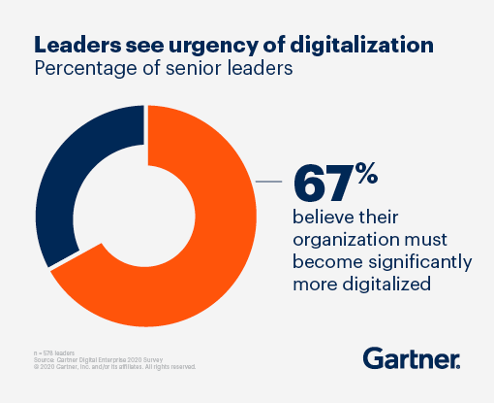
By Chris Gately, Chief Revenue Officer
Welcome to 2021. We are looking forward to an exciting year rife with opportunities including mergers, acquisitions, divestitures, government reporting mandates, and many other opportunities – ones that will enable CFOs, Vice Presidents of Finance & Planning and their analytics counterparts to reexamine their processes, tools, and structures to meet these challenges.
Too few finance teams are able to holistically take advantage of adaptive and predicative insights, recommendation engines, real-time user-defined analysis, and back office automation. I often hear from these finance leaders that they have put just one or two technologies in place offering marginal value: i.e., Robotic Process Automation for a process or two.
In fact, our friends at Gartner show that “76% of CFOs report lagging ROI from technology investments and only 24% are confident in their ability to solve the challenge. New technology can create serious disruption, while digitization opportunities are missed because a lack of roadmaps.”

Streamlined financial data and information sharing processes are critical to the success of any organization. However, in organizations across the globe, these processes often aren’t as successful or well informed as they should be. One client has had 30 acquisitions over the past four years delivering the finance team a mess of information across disparate sources including multiple ERPs, non-conforming charts of accounts, QuickBooks and the most mission critical of all systems in an organization: Microsoft Excel.
2021 is the time for the CFO’s office to lead the digital journey into Finance 360:
- Transform: Finance has to digitalize its own business processes to gain speed and efficiency.
- Step Forward: Move from a back-office to a front-office posture with real-time integration into all major transactional processes in Marketing, Sales, Service, Manufacturing, Supply Chain, and Procurement.
- Lead by Doing: Finance has to become the chief proponent of a ‘data-driven’ culture by tracking, measuring, and communicating performance using the fact-based language of KPIs.
Paradigm’s team has had great success enabling global companies to tackle this challenge including removing millions of excess costs annually. Now that I have summarized the problem and why it’s hard to solve, in my next post I will address the how and the value and impact of Finance leading the digital revolution.

